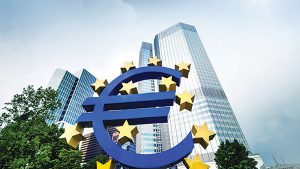Bloomberg
The European Central Bank (ECB) is ratcheting up pressure on some banks to keep 2022 bonuses in check amid fears about the darkening economic outlook, according to people with knowledge of the matter.
The euro area’s top banking supervisor has told individual lenders recently that it expects restraint in variable pay and dividends as it’s concerned the energy crunch could result in a wave of defaults, the people said, asking not to be identified as the discussions are private. The warnings have gained in urgency, with the ECB now
seeing a sharper slowdown in Europe next year as a likely scenario, the people said.
The rising pressure comes as several euro area banks including UniCredit SpA, Commerzbank AG and Deutsche Bank AG recently gave bullish guidance, even with surging inflation and rising interest rates weighing on the economic outlook. The lenders have also said it’s unlikely they’ll need to make massive credit provisions even with the additional challenge of soaring energy prices in Europe.
The ECB in 2020 urged banks to set aside large provisions in the face of the Covid lockdowns, which created a big drag on profits that year. The supervisor also implemented a de-facto ban on dividends and share buybacks that turned out to be damaging for bank valuations and became a target of public criticism from several high-profile euro area bankers.
The ECB thinks lenders may be underestimating the risks. There’s “a certain reluctance on the side of banks to seriously engage in supervisory discussions,†Andrea Enria, who leads the European Central Bank’s supervisory board, said recently. Europe is facing “a persistent and fully-fledged macroeconomic shock,†which requires supervisors “to exercise extreme caution,†he said.
ECB statistics show some early warning signs. The aggregate share of so-called stage two loans, where a borrower’s prospects have worsened, continued to rise. They reached 9.7% of total loans in the second quarter, up from 9.3% three months earlier. Still, the industry’s bad loans fell overall, while its capital levels were stable.
The ECB has previously shown it’s ready to intervene if it believes a bank’s bonus plans are excessive against the backdrop of heightened economic risks. It urged particular moderation during the Covid-19 pandemic and subsequently forced several lenders including BNP Paribas SA, Deutsche Bank and UniCredit to cut their bonus pools for 2020, Bloomberg has reported.
An ECB spokesman declined to comment.
Bonuses tend to account for a smaller amount of capital outflows than dividends, though examples like Deutsche Bank show that’s not always the case. Like all outflows, variable compensation can eat into a firm’s financial reserves.
The ECB pressure creates a conundrum for many banks as they’re headed for healthy profits after strong trading results. That typically leads to expectations among bankers that they’ll receive higher bonuses. Many lenders have also promised to make substantial payouts to investors over the coming years, potentially setting them up for a shareholder backlash if they end up reducing those amounts.
But choosing a heavy-handed approach to provisions and forcing banks to lower payouts can also create issues for the ECB. Enria said in his recent speech that warnings during the early Covid pandemic days that credit defaults might increase dramatically proved too pessimistic, feeding an attitude among banks “to dismiss their supervisors’ calls for prudence as unjustified conservatism.â€
The ECB in 2020 urged banks to set aside large provisions in the face of the Covid lockdowns, which created a big drag on profits that year. The supervisor also implemented a de-facto ban on dividends and share buybacks that turned out to be damaging for bank valuations and became a target of public criticism from several high-profile euro area bankers.
The ECB scrapped the pandemic-related restrictions on dividends and bonuses in 2021 and instead replaced them with an appeal to banks to adopt “a prudent and forward-looking approach†when deciding on bonuses.
 The Gulf Time Newspaper One of the finest business newspapers in the UAE brought to you by our professional writers and editors.
The Gulf Time Newspaper One of the finest business newspapers in the UAE brought to you by our professional writers and editors.
